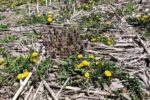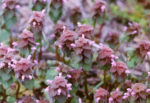Advertise Follow Us
Items Tagged with 'burndown herbicides'
ARTICLES
Consider Replanting Interval When Doing a Burndown Before Cover Crops
Consider herbicide options before cover crop establishment if problem weeds are an issue.
Read More
Relevant Spring Herbicide Issues: Burndown, Residuals & Drift
Residual herbicide considerations in the burndown during droughty periods, spraying during windy conditions, and problems with spraying near vineyards and sensitive areas.
Read More








